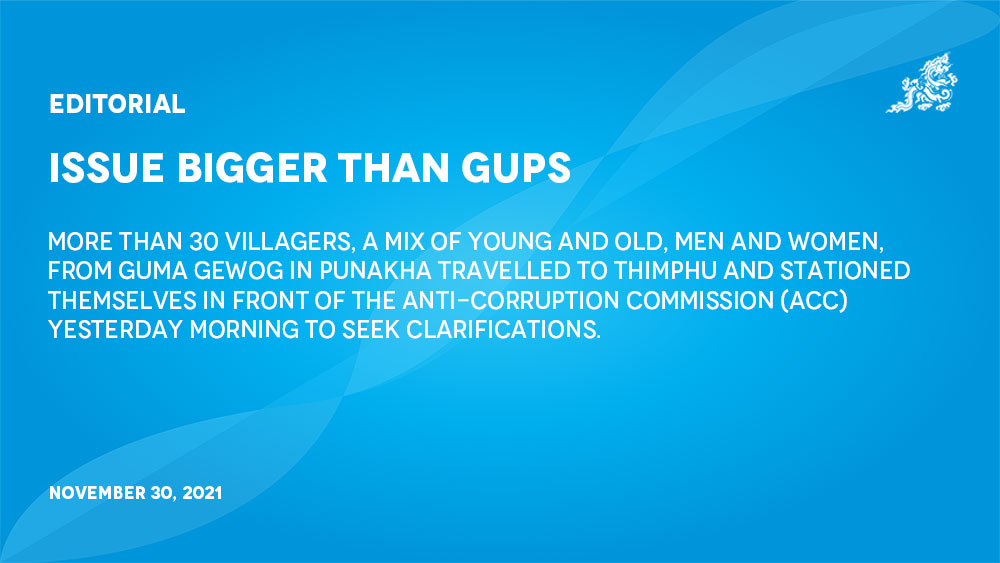More than 30 villagers, a mix of young and old, men and women, from Guma gewog in Punakha travelled to Thimphu and stationed themselves in front of the Anti-Corruption Commission (ACC) yesterday morning to seek clarifications.
One of their gup candidates has been disqualified from participating in the third gup election after the Royal Audit Authority (RAA) revoked his audit clearance because ACC had a case registered against him.
They wanted to know the authenticity of the complaint and understand the issue. As is standard, ACC could not share the details and they left home. But they asked a pertinent question: how can an allegation disqualify a person from taking part in the LG elections especially given the precedent established in the 2018 Parliamentary elections?
The RAA says that it revoked the audit clearances based on a Memorandum of Understanding with ACC. But the MoU leaves it up to the institution to make a rational decision. Both can exercise some discretion in entertaining cases because there is still an equal possibility of the courts finding them not guilty.
This also raises the question of due process. Article 7 (1) our Constitution prohibits the State from depriving any person’s right to “life, liberty and security” except in accordance with the due process of law. The due process of law means processes owed to the accused and hence protects the person against conviction except upon proof beyond a reasonable doubt of every fact necessary to constitute the crime with which he or she is charged.
Our Constitution imposes a duty on the State: the burden to prove beyond a reasonable doubt of every essential element of a crime which is obvious in Section 96.2 of Civil and Criminal Procedure Code.
Similarly, Article 7(16), gives every person charged with a penal offence the right to presume innocent until proven guilty. The enforcement of this right is at the foundation of the administration of Bhutanese criminal law.
We also have a chance to fix the gaps in the election system. RAA, ACC and the Election Commission of Bhutan must put their heads together and chalk out a solution. Otherwise, as the election approaches, every Dorji, Karma or Sonam will file complaints against any candidate. Should this become a trend, then potential candidates would not come forward to contest in an LG election if they have to undergo such harassment and humiliation. Some gewogs could end up without a candidate.
Similar issues will arise as Bhutanese become more politically mature and understand the ropes of a democratic society. That is normal. How quickly and effectively we deal with such issues will determine the success or failure of democracy.
We need to understand that in the end rule of law itself is not democratic government. It is needed to create a stable environment where democracy can function and where people can be secure in the knowledge that they will receive justice.
As our traditional society becomes a modern, we are now looking at the need for institutions to send the right signals. The judiciary’s response to this appeal, for example, will be an indication of the strength of the rule of law and, therefore, the stability of society.
It is a dilemma not just for the judiciary but also for society as a whole.


